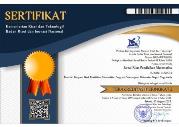Metacognitive skills of student in solving problems of two-variable linear equation systems in terms of self-regulated learning
DOI:
https://doi.org/10.21831/jrpm.v9i1.49163Keywords:
Metacognitive skill, problem solving, self-regulated learningAbstract
It is empirically known that metacognitive skill contributes to self-regulated learning. This study aims to describe students' metacognitive skills in three levels of self-regulated learning, particularly in solving problems of a two-variable linear equation system. Three indicators were used in metacognition skills, namely planning indicators, monitoring indicators, and evaluation indicators. Employing a descriptive qualitative approach, this study involved All students of grade VIII A of the academic year 2021/2022 from a state junior school as subjects involving each category for high, medium, and low self-regulated learning. The data were collected using questionnaires, tests, interviews, documentation, and observation. A triangulation method, The data were then analyzed through condensation, data presentation, and drawing conclusions. is the current study found that high learning students used their metacognitive skills well and met three indicators, namely planning indicators, monitoring indicators, and evaluation indicators. Students with moderate self-regulated learning were able to meet two indicators, including planning indicators and monitoring indicators, while those with low self-regulated learning only met planning indicators.
Downloads
Published
How to Cite
Issue
Section
License

Jurnal Riset Pendidikan Matematika by http://journal.uny.ac.id/index.php/jrpm/index is licensed under a Creative Commons Attribution-ShareAlike 4.0 International License.









